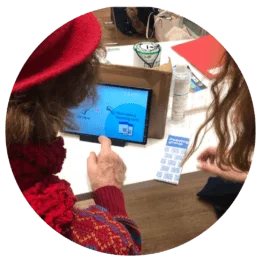

The London Recovery Board’s Digital Access for All Mission has set a goal for “Every Londoner to have access to good connectivity, basic digital skills and the device or support they need to be online by 2025.”
As part of this mission, the Greater London Authority (GLA) and the London Office of Technology and Innovation (LOTI) have launched the Digital Inclusion Innovation Programme (DIIP). Working with partners in the public, voluntary and private sectors, our goal is to use innovation methods to discover, design, develop and scale initiatives that support digitally excluded Londoners who are particularly vulnerable since the COVID-19 pandemic.
The COVID-19 pandemic was particularly hard on people living with dementia as lockdown stripped away the routines and family and community support they rely on. Community dementia support groups had to adapt quickly to use digital technologies to re-engage and support people in their homes in creative ways tailored to the specific needs of people living with dementia and their carers.
We saw an opportunity to take stock of the new digital skills and techniques developed for community dementia support and translate them into new hybrid approaches for supporting people in the community and helping them live safely in their own homes.
As part of this programme, LOTI and the Helix Centre (part of the UK Dementia Research Institute Care Research & Technology Centre at Imperial College London) undertook a London-wide project to co-design and pilot new ways to provide community dementia support.
Although this project focused on the needs of people living with dementia, it has the potential to inform and impact community support for other groups in a post-COVID society.
The Helix Centre is an innovation lab working at the heart of healthcare translating research into products that improve health outcomes. Its mission is to achieve high-quality care for all, worldwide and at scale. Helix is an interdisciplinary group of designers, technologists, clinicians and researchers that uses human-centred design to rapidly dissect problems, identify opportunities and develop clinically-evaluated digital solutions.
This project was made possible by the following people:
Thank you to the following community organisation collaborators for hosting our workshops and facilitating the pilot with members of their communities:
We are also grateful to the following people for making connections in their respective boroughs and enabling the research:
And thank you to many others for joining our workshops and Show & Tell sessions and for sharing feedback and advice.